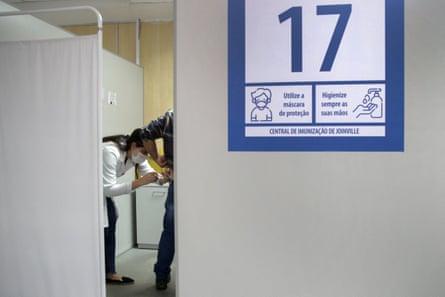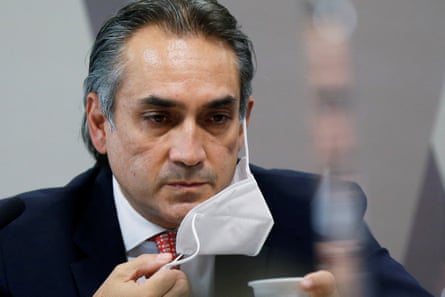Pfizer has been accused of holding Brazil “to ransom” over demands to shield itself from possible vaccine side-effect lawsuits in its contract to supply the country with 100m Covid jabs.
In its $1bn (£700m) deal with Pfizer Export BV, signed in March, despite its prior complaints, the Brazilian government agreed that “a liability waiver be signed for any possible side-effects of the vaccine, exempting Pfizer from any civil liability for serious side-effects arising from the use of the vaccine, indefinitely”.
Indemnity from compensation claims has been common in contracts between many countries and big pharma companies since the late 1980s.
The contract also stipulated that Brazil would cede to US courts, convened secretly, in the event of any contractual disputes relating to the vaccines.
In April, the contract was leaked on the health ministry website – a confidentiality agreement with Pfizer prevents the publication of its contracts. It was removed soon after and went largely unnoticed outside Brazil until the information was tweeted by a French lawyer and writer last month.
“Purchaser hereby agrees to indemnify, defend and hold harmless Pfizer, BioNTech, [and] each of their affiliates … from and against any and all suits, claims, actions, demands, losses, damages, liabilities, settlements, penalties, fines, costs and expenses … caused by, arising out of, relating to, or resulting from the vaccine,” reads the contract.
Echoing AstraZeneca’s acrimonious row with the EU, the Brazilian government had previously complained about Pfizer’s stipulation “that if there is a delay in delivery, there is no penalty”. But it agreed in the contract that while Pfizer would “use commercially reasonable efforts to meet the delivery schedule” it would ultimately, “under no circumstances be subject to or liable for any late delivery penalties”.
The leak also revealed that Brazil agreed not to “use the name, trade name, service marks, trademarks, trade dress or logos” of Pfizer in “publicity releases, advertising or any other publication” without its “prior written consent” in each instance.
The Bureau of Investigative Journalism reported in February that Pfizer had demanded Brazil and Argentina put up sovereign assets as collateral to guarantee indemnity, as well as create a guarantee fund with money deposited in a foreign bank account. Pfizer said it had not interfered “with any country’s diplomatic, military, or culturally significant assets”.
“Everyone already knows about Pfizer’s clauses,” said the then health minister, Eduardo Pazuello in January. “I guess I don’t need to repeat it, but I’ll be succinct: complete disclaimer for side-effects from today to infinity. That simple. Brazilian courts waive any legal action on the company. That simple. [In addition to] Brazilian assets abroad available as collateral and long-term deposit for future actions abroad.”
The contract further reveals that Brazil elicited much cheaper jabs from Pfizer than the EU, at about $10 (£7) a dose, while the pharmaceutical giant upped the number of doses it pledged to provide.
Campaigners said Pfizer had exhibited behaviour suggesting it was more interested in protecting profits than safeguarding the public.

Alena Ivanova, campaigns officer at Global Justice Now, said: “Pfizer is all too happy to cash in on publicly funded coronavirus vaccines, but doesn’t want to take on any of the risk. It’s an all too familiar move from pharmaceutical companies that seem more interested in protecting their profits than protecting the public.
“We can’t keep putting our faith in private companies to provide lifesaving medicines, only to see them hold countries to ransom.”
As required by domestic law, the government released online all vaccine acquisition contracts, except those from Johnson & Johnson and Pfizer due to the confidentiality clauses. Pfizer has been credited with saving untold lives with its vaccine but has also faced criticism for the disparity of its rollout after it prioritised higher-priced sales in richer countries.
Arthur Rollo, the former national consumer secretary at Brazil’s justice ministry, said it was “absolutely questionable to keep an administrative contract confidential”.
He added: “The public administration has a duty of transparency, even more in times when there is suspicion of embezzlement in the purchase of vaccines. To the extent that Janssen [Johnson & Johnson’s subsidiary] and Pfizer say their contracts are standardised, it doesn’t seem reasonable to require this secrecy clause because you can’t compare whether the contract is the same or not in other countries.”
French lawyer and writer Juan Branco, who posted the contract on Twitter, said that since the production cost of a Pfizer vaccine is believed to be a maximum of $2 (£1.50), the legitimacy of the profits should be questioned. “This debate can’t happen if the public and the citizens are kept out of the loop,” he added.
Pfizer’s Covid vaccine sales brought in $3.5bn (£2.5bn) in the first three months of this year, nearly a quarter of its revenue. Pfizer/BioNTech aims to produce 3bn doses by the end of this year and 4bn in 2022. Analysts have forecast revenue of over $6.6bn (£4.8bn) for the Pfizer/BioNTech shot in 2023, according to Reuters, mostly from boosters.

Last month, Brazil said it would begin to give booster shots of the Pfizer/BioNTech vaccine to immunosuppressed or vulnerable people, and over-80s. Meanwhile, the companies said they had signed a deal with Brazil’s Eurofarma Laboratórios SA to manufacture their vaccine for distribution within Latin America.
It marks a turnaround for the Brazilian government. Last year, the far-right president, Jair Bolsonaro, who had been openly dismissive of Pfizer’s proposals, sarcastically claimed that vaccines could turn recipients into “alligators” and officials in his government called the company’s demands “abusive”.

Brazil’s congress has launched an inquiry into the government’s response to the pandemic and sluggish vaccine rollout. Those leading the investigation believe Bolsonaro’s administration was “negligent” in not buying vaccines in 2020 while pushing ineffective drugs such as chloroquine, and that lives could have been saved had the government acted earlier.
At a televised congressional inquiry in May, Pfizer’s Latin America president, Carlos Murillo, said indemnity clauses were operative in more than 110 countries and rejected claims the company had been exploitative.
“In this pandemic, Pfizer, in an unprecedented situation, wanted everyone to collaborate with this process. For this reason, it defined the same conditions for all countries as it did for Brazil,” he said.
Pfizer spokesperson Sharon Castillo said indemnification clauses were common in public health emergencies. “In the context of bilateral negotiations, Pfizer and BioNTech have no intention of interfering with any country’s diplomatic, military, or culturally significant assets, and any suggestion to the contrary is misleading and factually incorrect,” she said.
“Pfizer has a collaborative relationship with governments with which it has negotiated bilateral contracts,” she said. “As a result, the Pfizer/BioNTech Covid-19 vaccine has reached more than 120 countries and territories in every region of the world.
“In all our contracts, Pfizer/BioNTech are deploying a pricing structure for high, middle, and low/lower-middle-income countries,” she said.
“Pfizer has self-funded its Covid-19 vaccine. The company deployed $2bn before even knowing if the vaccine would be successful because we understood what was at stake. Just recently, we authorised spending an additional $600m on Covid-19 research and development that will bring our total spend for research and development in 2021 to more than $1bn.
“We take adverse events that are potentially associated with our Covid-19 vaccine very seriously.”
Brazil’s health ministry said it was abiding by the “confidentiality rule” and could not comment.
